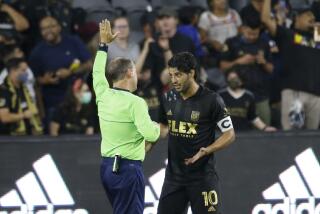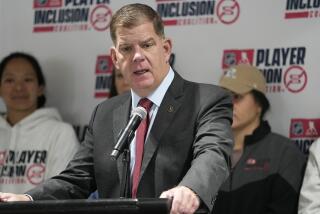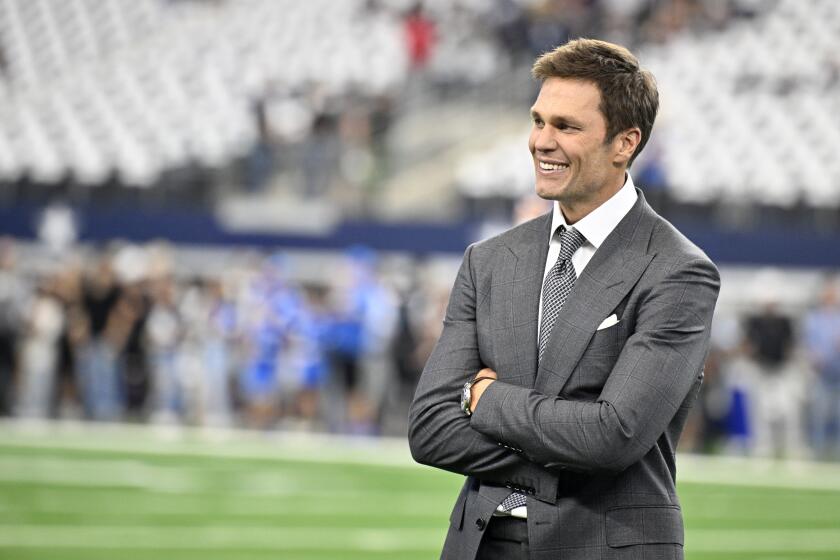Plenty of action on first day of NHL lockout but no labor negotiations
NEW YORK — Locked-out players began securing spots overseas and the NHL launched a public-relations offensive Sunday, but no labor negotiations took place on the first day of a stoppage imposed late Saturday by Commissioner Gary Bettman.
Deputy Commissioner Bill Daly talked to Steve Fehr, special counsel for the NHL Players’ Assn., but Daly said Sunday he expected things to be quiet for the next 24 to 48 hours in deference to the Jewish holiday of Rosh Hashana, which began at sundown. Training camps are scheduled to open Friday and the first exhibition game next Sunday.
In a message to fans, the NHL said on its website it is “committed to negotiating around the clock to reach a new CBA that is fair to the players and the 30 NHL teams. … The league, the clubs and the players all have a stake in resolving our bargaining issues appropriately and getting the puck dropped as soon as possible.”
Many teams’ websites posted that message or similar sentiments from a club executive. Images of active players vanished from the home pages of teams’ websites, conforming to a league policy of not promoting players during a lockout.
The NHLPA issued a video on YouTube that features five players sympathizing with fans and saying they want to play. “I think the goal here is to find something that’s fair and reasonable and something we can instill for years to come where we’re not going to have these problems down the road,” Chicago Blackhawks captain Jonathan Toews said.
Scoring champion and most valuable player Evgeni Malkin of the Pittsburgh Penguins and Russian compatriot Sergei Gonchar of the Ottawa Senators signed with Metallurg of Russia’s Kontinental Hockey League for the duration of the lockout. Detroit Red Wings standout Pavel Datsyuk will play for Ak Bars Kazan of the KHL and Jaromir Jagr of the Dallas Stars will play in the Czech League for Kladno, in which he has part ownership.
Prominent agent Allan Walsh of Octagon Hockey said client Ondrej Pavelec of the Winnipeg Jets will play for HC Trinec in the Czech League and client Ruslan Fedotenko of the Philadelphia Flyers will play for Donetsk of the KHL.
“Bettman and the owners are following a playbook. We’ve seen it in 2004, we’ve seen it more recently in the NFL and the NBA,” Walsh said. “Players love the game, which has historically been used against them by the power brokers in the NHL going back to the 1920s. I don’t think Gary cares about the game, the players or the fans. He’s going for the pot of gold again. That’s the unknown factor on how long they’ll shut the game down this time.”
Patrick Rishe, an economics professor at Webster University in St. Louis and contributor to Forbes’ SportsMoney blog, said he doubts the entire season will be lost “because I’d like to think that both sides are a lot smarter than that.” He said he anticipates the cancellation of two to six weeks’ play.
Asked whether this dispute is worth losing games over because it’s centered on percentages of revenue rather than the economic principles that triggered the 2004-05 lockout, Rishe said losing games might still make sense for owners who decide the marginal costs of losing immediate revenue from tickets, parking and other sources are outweighed by the eventual benefits of a restructured system.
“When you put it in that light, without having done hard-core research on the numbers, I think most of these teams are thinking, ‘We’re willing to incur the short-term costs of missing 20 to 25 games.’ That’s missing between 10 and 13 home dates,” he said. “I think teams are willing to make that sacrifice for the longer-term gain of more cost containment and greater revenue-sharing.”
Matt Winkler, who launched Georgetown University’s sports industry management program and worked for the Washington Capitals, predicted the season will begin on New Year’s Day with the Winter Classic, just as the NBA returned from a lockout last season with a full day of Christmas Day games.
“There’s your go/no-go period,” he said. “Look at their assets and where they get their revenue from. It’s churning during the season. Gate- and jersey-driven. They can’t afford to stay out. They just can’t. Now, that doesn’t mean that’s what they’re going to do. I think they’re going to play.”
The Kings and Ducks said season-ticket holders who keep money with the team will receive a 5% annual percentage interest rate and credit for all games missed. Season-ticket holders who prefer an immediate refund for games missed will get that refund plus 1% interest.
twitter.com/helenenothelen
More to Read
Go beyond the scoreboard
Get the latest on L.A.'s teams in the daily Sports Report newsletter.
You may occasionally receive promotional content from the Los Angeles Times.











